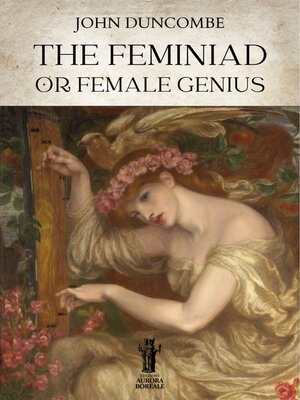
Sign up to save your library
With an OverDrive account, you can save your favorite libraries for at-a-glance information about availability. Find out more about OverDrive accounts.
Find this title in Libby, the library reading app by OverDrive.



Search for a digital library with this title
Title found at these libraries:
| Library Name | Distance |
|---|---|
| Loading... |
John Duncombe (1729-1786) was an English clergyman, poet and writer.
Born in London on September 29, 1729, the only child of the author and playwright William Duncombe and his wife Elizabeth, he was educated at two schools in Essex, before entering, July, 1, 1745, Corpus Christi College, Cambridge, where he proceeded B.A. in 1748 and M.A. in 1752. He was later elected a fellow of his college, and in 1753 was ordained at Kew Chapel by John Thomas, the bishop of Peterborough. On the recommendation of Archbishop Thomas Herring, he was appointed to the curacy of Sundridge in Kent.
He contributed to the Gentleman's Magazine under the pseudonym Crito, was a well-known poet, and wrote in 1754 a celebration of British women poets, The Feminead, or Female Genius.
The piece is an essay in verse, a form popular in the eighteenth century, consisting of 380 lines of heroic couplets. Duncombe argues that women «shine, / In mind and person equally divine» and urges his readers to resist the «undisputed reign of prejudice» and instead «sing the glories of a sister-choir». He appeals to his readers' sense of nationalism by contrasting «free-born» «British nymphs» to a stereotypical image of women in a «seraglio», and situates his subjects in a cultural lineage stemming from classical Greece and Rome.
Duncombe takes care to clarify that his support of women artists only extends to those who continue to fulfill their assigned feminine roles and suggests that the pursuit of art and culture might keep women away from more frivolous pursuits.
Born in London on September 29, 1729, the only child of the author and playwright William Duncombe and his wife Elizabeth, he was educated at two schools in Essex, before entering, July, 1, 1745, Corpus Christi College, Cambridge, where he proceeded B.A. in 1748 and M.A. in 1752. He was later elected a fellow of his college, and in 1753 was ordained at Kew Chapel by John Thomas, the bishop of Peterborough. On the recommendation of Archbishop Thomas Herring, he was appointed to the curacy of Sundridge in Kent.
He contributed to the Gentleman's Magazine under the pseudonym Crito, was a well-known poet, and wrote in 1754 a celebration of British women poets, The Feminead, or Female Genius.
The piece is an essay in verse, a form popular in the eighteenth century, consisting of 380 lines of heroic couplets. Duncombe argues that women «shine, / In mind and person equally divine» and urges his readers to resist the «undisputed reign of prejudice» and instead «sing the glories of a sister-choir». He appeals to his readers' sense of nationalism by contrasting «free-born» «British nymphs» to a stereotypical image of women in a «seraglio», and situates his subjects in a cultural lineage stemming from classical Greece and Rome.
Duncombe takes care to clarify that his support of women artists only extends to those who continue to fulfill their assigned feminine roles and suggests that the pursuit of art and culture might keep women away from more frivolous pursuits.







